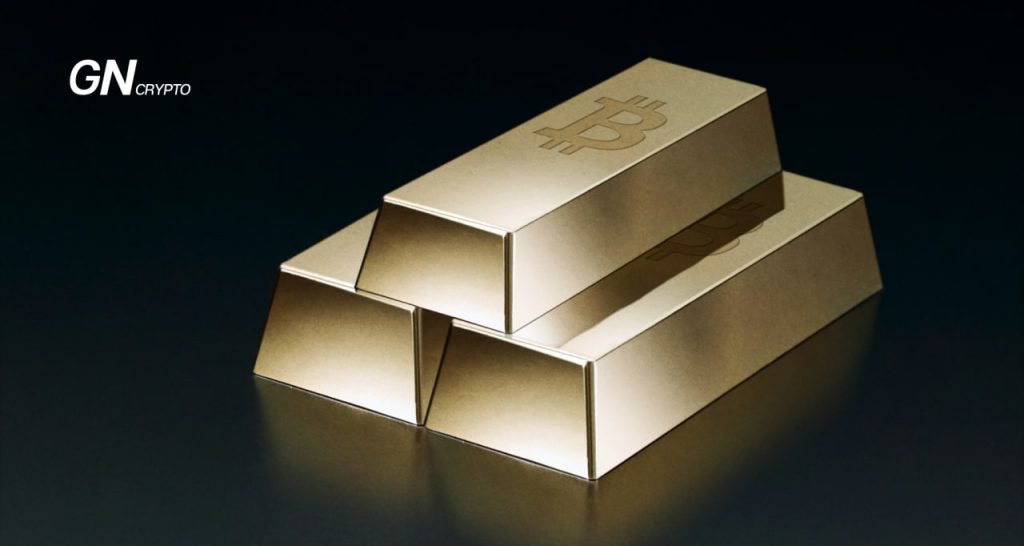Digital Gold: Why Bitcoin Earned This Title

Bitcoin, often referred to as “digital gold,” captures the attention of investors thanks to its unique characteristics and potential. In this article, we explore the reasons behind this title and its similarities to traditional gold.
On this page
- Key Attributes of Gold and Its Parallels with Bitcoin
- Bitcoin’s Advantages Over Gold
- Bitcoin’s Disadvantages
- Who First Called Bitcoin “Digital Gold”?
- Fascinating Facts About Bitcoin
- Satoshi Nakamoto
- The First Bitcoin Purchase: Pizza for 10,000 BTC
- The Genesis Block
- A Nation That Officially Recognized Bitcoin as Currency
- Lost Bitcoins
- The Youngest Bitcoin Millionaire
Bitcoin, the first and most renowned cryptocurrency in the world, has gained massive popularity and recognition. One of the most common comparisons used to describe its value is the term “digital gold.” This designation is not coincidental—experts and enthusiasts have identified qualities in Bitcoin that closely parallel those of traditional gold.
Key Attributes of Gold and Its Parallels with Bitcoin
Gold has been a symbol of stability, wealth, and a dependable medium of exchange for centuries. Its unique physical and economic traits have made it a trusted store of value. Similarly, Bitcoin, though just over a decade old, has already garnered a comparable reputation.
Why is this the case?
Let’s explore the key characteristics of gold and how they mirror Bitcoin’s features.
Finite Supply
Gold is a limited resource; its natural reserves are finite. While mining increases its availability, the pace of extraction lags behind growing demand, and discoveries of new deposits are becoming increasingly rare. Similarly, Bitcoin's issuance is governed by a mathematical algorithm, which caps its total supply at 21 million coins. Additionally, Bitcoin’s production rate slows over time through an event known as halving, which halves the rewards for mining approximately every four years.
This built-in scarcity makes Bitcoin a deflationary asset, immune to arbitrary creation, unlike fiat currencies that can be printed at will.
Bitcoin mining operation. Source: AdobeStock / Photocreo Bednarek
Durability and Resilience
Gold’s durability is unparalleled—it doesn’t corrode, degrade, or lose its value over time, maintaining its relevance for millennia. Similarly, Bitcoin's digital existence is safeguarded by blockchain technology, ensuring its durability and resilience. Transactions recorded on the blockchain are immutable and permanently stored, providing stability and trustworthiness in its decentralized ledger.
Store of Value
For centuries, gold has been a reliable store of value, particularly during economic uncertainties. Bitcoin now serves a similar purpose in the digital age. Its scarcity and reliability make it an appealing investment and a hedge against inflation.
Gold mining during the Klondike Gold Rush. Source: https://data2.collectionscanada.ca/ap/a/a016944.jpg
Sovereignty and Independence
Gold is a universal asset, independent of any government or central authority, and retains value across borders. Bitcoin mirrors this independence through its decentralized design, operating without the oversight of central banks or governments. This autonomy enhances its appeal to those seeking financial sovereignty.
Bitcoin’s Advantages Over Gold
Although Bitcoin shares many traits with gold, it offers several distinct advantages that make it more appealing in today’s digital world. The technological features of cryptocurrencies unlock possibilities that traditional assets like gold cannot provide.
Here are the key aspects where Bitcoin surpasses gold.
Ease of Use
Bitcoin is highly mobile and can be transferred globally within minutes, without the logistical challenges of physically transporting gold. Storing Bitcoin is also simpler—it requires only a digital wallet, as opposed to a secure vault or safe for physical assets.
Transparency and Security
Bitcoin transactions are recorded on a public blockchain, ensuring full transparency and traceability. Unlike gold, which can be counterfeited, Bitcoin’s cryptographic framework prevents duplication or falsification, offering an unmatched level of security.
Accessibility
While gold often requires significant capital investment, Bitcoin is divisible into small units, such as satoshis, making it accessible to people across various income levels. Moreover, Bitcoin eliminates the need for a bank account or intermediary financial institutions. All you need is internet access to manage transactions and store cryptocurrency directly in a digital wallet. This enhances convenience and offers greater financial freedom compared to traditional systems.
Bitcoin’s Disadvantages
While Bitcoin boasts numerous advantages, it is not without its drawbacks. Its extreme volatility surpasses that of gold, making it a risky investment for many. Environmental concerns surrounding Bitcoin mining's high energy consumption are frequently raised. Other limitations include elevated transaction fees during peak network activity, limited acceptance as a payment method, potential vulnerability to cyberattacks, dependence on internet connectivity, and relatively slow transaction speeds.
Despite these challenges, Bitcoin remains highly sought after due to its unique attributes.
Who First Called Bitcoin “Digital Gold”?
The term “digital gold” likely originated with The New York Times journalist Nathaniel Popper. He introduced it in his 2015 book Digital Gold: Bitcoin and the Inside Story of the Misfits and Millionaires Trying to Reinvent Money. Interest in the phrase “Bitcoin digital gold” peaked on Google in December 2017, as the cryptocurrency's price reached a then-record high of approximately $20,000 per coin.
Nathaniel Popper’s book cover: Digital Gold: Bitcoin and the Inside Story of the Misfits and Millionaires Trying to Reinvent Money. Source: https://techcrunch.com/
Fascinating Facts About Bitcoin
Satoshi Nakamoto
The true identity behind the pseudonym Satoshi Nakamoto remains a mystery. Many theories speculate on whether it’s an individual or a group. HBO even released a documentary claiming to uncover the true identity of the Bitcoin creator, but no verifiable evidence has been found to confirm this.
The First Bitcoin Purchase: Pizza for 10,000 BTC
On May 22, 2010, programmer Laszlo Hanyecz made history by using Bitcoin for the first documented purchase—two pizzas. At the time, the 10,000 BTC he spent was worth approximately $25. Today, those coins would be valued in the billions. This milestone is commemorated annually in the crypto world as “Bitcoin Pizza Day.”
Laszlo’s original offer of 10,000 BTC for two pizzas. Source: https://bitcointalk.org/index.php?topic=137.0
The Genesis Block
The first Bitcoin block, known as the “Genesis Block,” was mined by Satoshi Nakamoto on January 3, 2009. Embedded in its hash is the headline from The Times: “Chancellor on brink of second bailout for banks.” This message reflects Bitcoin’s origins as a response to the global financial crisis of 2007-2008, which was marked by the collapse of major banks, economic downturns, unemployment spikes, and significant government bailouts.
The iconic front page of The Times is now a collector’s item among Bitcoin enthusiasts. Source: www.etsy.com
A Nation That Officially Recognized Bitcoin as Currency
In 2021, El Salvador became the first country in the world to officially recognize Bitcoin as legal tender. This unprecedented move sparked global interest and debate while bringing significant advantages to El Salvador.
Related: Argentina Investigates El Salvador's Bitcoin Integration Strategy
Lost Bitcoins
Due to lost private keys, improper storage practices, and, in some cases, the untimely deaths of owners, a substantial number of bitcoins are considered permanently inaccessible. Estimates suggest that approximately 20% of all BTC may be lost forever.
The Youngest Bitcoin Millionaire
Erik Finman became the youngest cryptocurrency millionaire at just 12 years old. In 2011, after receiving $1,000 as a gift from his grandmother, Erik invested in Bitcoin, then a nascent and relatively unknown technology. He purchased 100 bitcoins at $10–12 each, inspired by his older brother’s belief in cryptocurrency’s potential. Despite skepticism from his teachers and peers, Erik saw Bitcoin as the foundation of a revolutionary financial system. By 2017, when Bitcoin’s price surged dramatically, his initial investment turned into millions of dollars.
Related: Teen Millionaires? The Risks and Rewards of Young Investors
Bitcoin exhibits traits that align it with gold, such as scarcity and value retention, but its unique features set it apart as a groundbreaking financial instrument. Is it truly “digital gold”? For many, the answer is a resounding yes, though each individual can form their own opinion.
One thing remains certain: Bitcoin continues to transform the global financial system, paving the way for new investment opportunities and reimagining economic frameworks.
The content on The Coinomist is for informational purposes only and should not be interpreted as financial advice. While we strive to provide accurate and up-to-date information, we do not guarantee the accuracy, completeness, or reliability of any content. Neither we accept liability for any errors or omissions in the information provided or for any financial losses incurred as a result of relying on this information. Actions based on this content are at your own risk. Always do your own research and consult a professional. See our Terms, Privacy Policy, and Disclaimers for more details.
































